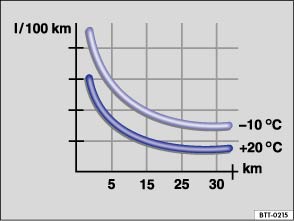Volkswagen Polo Owners Manual: Driving in a fuel-efficient manner

Fig. 118 Fuel consumption in litres per 100 km at two different outside temperatures
 First read and observe the introductory information
and safety warnings
First read and observe the introductory information
and safety warnings By adopting an economical driving style and anticipating the traffic situation ahead, you can easily reduce fuel consumption by 10-15%.
Cars use most fuel when accelerating. If you think ahead when driving, you will need to brake less and thus accelerate less. Wherever possible, let the car roll slowly to a stop, for instance when you can see that the next traffic lights are red.
Avoid short journeys
Directly after a cold start, the engine has a very high fuel consumption. The engine reaches its working temperature after a few kilometres, when fuel consumption will return to a normal level.
The engine and catalytic converter need to reach their proper working temperature in order to minimise fuel consumption and emissions. The outside temperature is a key factor.
The different rates of fuel consumption for the same distance at both +20°C (+68°F) and at -10°C (+14°F) are shown in .
Therefore, avoid making too many short journeys and car share whenever possible.
Under the same conditions, the vehicle will use more fuel in winter than in summer.
Not only is it illegal in some countries to warm up the cold engine by running it while the vehicle is stationary, it is also technically unnecessary and a waste of fuel.
Adjust the tyre pressure
The correct tyre pressure reduces rolling resistance and therefore also fuel consumption.
Make sure that any new tyres purchased have optimum rolling resistance.
Using low viscosity engine oils
Fully synthetic low viscosity engine oils reduce fuel consumption. Low viscosity engine oils decrease frictional resistance in the engine and spread better and more quickly, especially for cold starts. They are especially effective in vehicles that make a lot of short journeys.
Always ensure that the engine oil level is correct and that you keep to the service intervals (oil change intervals).
When buying engine oil, always ensure that it complies with engine oil norms and has been approved by Volkswagen.
Avoid unnecessary loads
Lighter vehicles are more economical and have lower environmental impact. An extra weight of 100 kg can increase fuel consumption by up to 0.3 l/100km.
Remove all unnecessary objects and loads from the vehicle.
Remove any unnecessary special equipment and accessories
The more aerodynamic a vehicle, the lower its fuel consumption. Special equipment and accessories, such as roof carriers or bicycle carriers, make the vehicle less aerodynamic.
You should therefore remove any special equipment and luggage carriers that are not in use, especially if you are going to be driving at high speeds.
 An economic driving style
An economic driving style
First read and observe the introductory information
and safety warnings Changing gear earlier
In principle, the highest gear is always the most economical gear. A rule of
thumb for most vehicle ...
 Steering
Steering
...
Other materials:
Stowage compartment
on the front passenger side
Fig. 97 Stowage compartment on the front
passenger side
Fig. 98 Open stowage compartment on the
front passenger side
First read and observe the introductory information
and safety warnings
Opening and closing the stowage compartment
To open, pull up the opening lever .
To close ...
Refrigerant Circuit Repair Information
WARNING
When performing work on refrigerant circuit, observe
all generally applicable safety precautions and pressure
vessel regulations.
Cautio ...
Introduction
This chapter contains information on the following subjects:
→ Positive and earth jump lead connection points
→ How to start the engine using jump leads
If the engine fails to start because the vehicle battery is flat, the flat
battery can be connected to the battery of anothe ...
